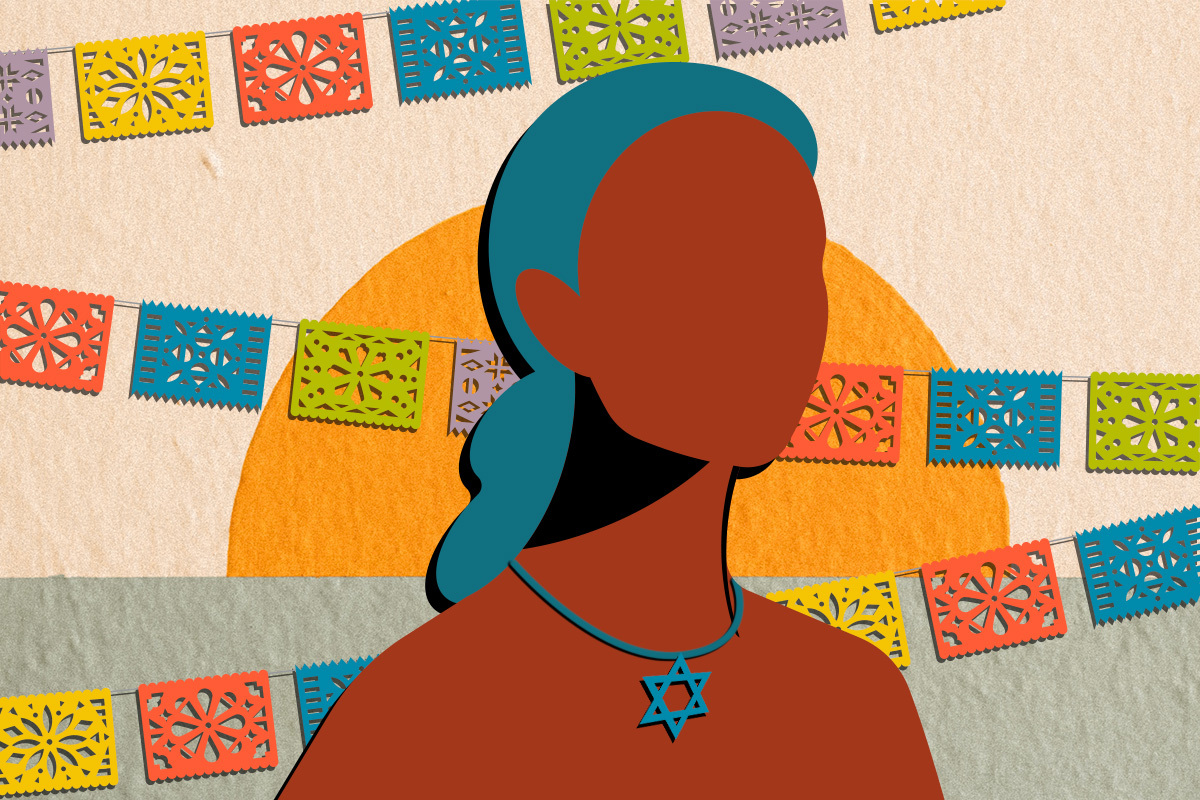“You know, according to some people, you’re technically not even fully Jewish.”
Abuela was upset at me — I forgot about what — and that was the most pointed insult she could ever throw. I knew she wanted to hurt me.
As an Orthodox woman, her Judaism is her entire identity. As a child of a blend of identities, my Jewishness is a cultural and familial foundation — not based on belief, nor actual religion, and certainly not something that anyone could ever take away from me. Not even her.
When I ask about my ancestors, all the different countries and languages they come from, she stares at me unblinking with her pool-green eyes, purple sparkle eyeshadow shimmering over the Shabbat table. “Ariellita, I don’t understand these questions. What does it matter where anyone’s from? They’re Jewish. You’re Jewish. That’s all that matters.”
I am Jewish. But I’m also Latina. We practice Sephardic traditions, but are actually Romaniote (we suspect). Turkish blood is our ancestry, but so is Poland, Portugal, Mongolia, Indigenous Mayan and probably Moroccan, too. I’m a child of immigrants from Cuba and Guatemala — political refugees, whose parents and grandparents were also political refugees. Such is the story of the Jewish diaspora, especially if where they’ve landed keeps getting destabilized by politicians after sugarcane, bananas, indigenous blood.
Passover songs are in Ladino and recently, the delicious spice of arak graces our tables and tongues once again. On the table there’s also almost always arroz con pollo and some version of platano, dalmas and (pareve) flan.
To me, it’s less about the prayers and more about the culture. It’s less about the Torah and more about the many languages my ancestors have said their prayers in — different words perhaps, but always the same intent.
As a child, my mom would tuck me into bed, put her hands over my eyes and sing me the Shema. She’d always end with “que Dios te bendiga y te proteja,” the prayer of the mothers in her country, a primarily Catholic one.
On Christmas Eve, most American Jews order Chinese take-out; my family roasted a pig — slow cooking for hours in a caja china, just like every other Cuban on the island used to do.
We’re Jewish, but we’re also a lot of other things too, picking up traditions from all the places we’ve landed along the way.
We’re Jewish, but we’re also nothing like the (very few) Jews we see on TV — most of them nerdy and nervous Ashkenazi men with balding heads chasing after thin blonde non-Jewish women, the supposed American Dream.
We’re Jewish, but our skin is darker, our food is spicier, and we dance salsa at family bar mitzvahs, our Stars of David gleaming and glittering against our brown skin as we kiss each other hello, goodbye and for no other reason than we are alive.
Yiddish is the language of most American Jewish ancestors, but what of ours? We reach back into our bones and find Ladino in pieces, bring it back to the light of our dinner tables, si kere el dio, kerido.
Reconciling all my identities has been a lifelong journey — my family has been taught to look forward, never to look back — and yet, here I am, mixing arroz con leche on the stove to Arabic trap music, moving my hips as the sun sets over another Jewish holiday, asking questions, connecting the dots, trying to understand the blend of flavors that is my blood.
I thought I was alone, but of course, I’m not.
As a PUENTES fellow, a program designed for Latin Jews, I now spend hours pouring over my different pieces with others who have also been gifted with this colorful mosaic of identity. I run my fingers over each tile, deciding where and how to place them, uncovering the patterns that have long been buried, placing each one with my hands on my walls.
I no longer have all the different azulejo pieces swept in a shattered pile behind an exterior no one can ever seem to place. My family history is one of displacement, and now, I am in the process — perhaps, forever — of my own placement. There will always be a new piece in the pile to discover, dust off and place proudly next to all the rest.
I am a technicolor dreamcoat of ancestry, a burning bush of blood — and all of it is Jewish. Not because I claim it, but because it claimed me every time it made a choice to survive.
Every time it ran, it prayed, it built synagogues in Caribbean places, it baked bourekas in the rented ovens of foreign homes. Every time it sang its Spanish songs and climbed volcanoes barefoot, selling leather shoelaces on cobble-stoned streets. Every time it got chased, spit at and smacked. Every time it got up and kept going, no matter the land and no matter the sky.
I didn’t choose it, but every day, I’m the one who chooses to make Judaism mine.
I never thought I’d get here — not to the point of understanding, or having all the answers, because I have more questions than I did before — but of getting to simply begin the process of claiming myself.
To own my history enough to ink a nazar baby pin on my body, evil eye protecting me since birth, on retreat in Mexico City with my fellow Jewtinas. Of connecting my queer identity to my Tío Joseíto’s, the only Jew to storm the Bay of Pigs. To wear the beaded earrings the descendants of my ancestors are still sewing, their language lost to me, but still alive in villages tucked behind the sacred lakes of my mother’s childhood backyard.
To be Jewish not the way anyone expects me to be, but the way I simply am.



